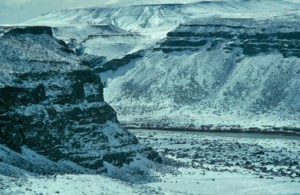 Why is energy production in the United States subject to so much political oversight? Public News Service reports the latest news about oil shale: “Two competing plans for the development of oil shale in the West are making their way through Washington, D.C.” Both plans involve government-owned lands, and both are subject to extensive political wrangling.
Why is energy production in the United States subject to so much political oversight? Public News Service reports the latest news about oil shale: “Two competing plans for the development of oil shale in the West are making their way through Washington, D.C.” Both plans involve government-owned lands, and both are subject to extensive political wrangling.
The Reason Foundation’s Leonard Gilroy summarizes a major reason why federal politicians exert so much control over energy production: “The federal government owns nearly 30 percent of all the land in the country,” including “more than 84 percent of the land in Nevada” and large chunks the land of various other states.
The fact that the government has socialized so much land necessarily involves federal politicians in the management of that land and of any economic activity thereon.
Those federal lands should be converted to private property for Constitutional, economic, and (most importantly) moral reasons.
Regarding the Constitution, as legal scholar Rob Natelson points out in his book The Original Constitution, permanent federal land ownership for unenumerated purposes is contrary to the intent of the Constitution. Natelson points out that “Founding-Era records disclose a universal belief that most federal lands would be sold promptly.”
In terms of economic incentives, private owners, whether individuals, for-profit businesses, or conservation groups, tend to manage their property (whether by developing it, preserving it, selling it, or leasing it) to best achieve their values. Politicians tend to manage lands to the advantage of those with the most political pull.
More fundamentally, the government’s proper role is to protect individual rights, including rights to develop and gain title to property; the government has no moral business managing lands or their development. Property owners, not political fiat, should determine the development of oil shale, natural gas, outdoor recreation, and every other land use.
If you enjoyed this post, consider subscribing to The Objective Standard and making objective journalism a regular part of your life.
Related:
Image: Wikimedia Commons













